
» KEY POINTS
- The Republican Party was formed with progressive policies on personal freedoms, labor and wage protections, protecting immigrants, unifying people across many beliefs, and much more.
- After gaining near monopolistic political control for over 70 years, the Republican Party became an entrenched establishment that changed its values in order to maintain that power.
- As the Republican Party continues to evolve, it will have an agenda that differs greatly from what Republicans even from a few years ago would consider sacrosanct.

On May 17, 1860, an only six-year-old political party published their second ever platform which commenced (courtesy of the University of California Santa Barbara “The American Presidency Project”):
That the history of the nation during the last four years, has fully established the propriety and necessity of the organization and perpetuation of the... party, and that the causes which called it into existence are permanent in their nature, and now, more than ever before, demand its peaceful and constitutional triumph.
Thus began an agenda that laid out broad goals that the members of this party felt expressed a moral imperative to protect this nation and all its people from the demagogues of the political machinery that were only interested in maintaining their power. Among those ideals were:
- Personal Freedom: That the normal condition... of the United States is that of freedom: That, as our [forefathers]... ordained that “no persons should be deprived of life, liberty or property without due process of law,” it becomes our duty, by legislation, whenever such legislation is necessary, to maintain this provision of the Constitution against all attempts to violate it...
- Labor and Wages: ...[T]o encourage the development of the industrial interests of the whole country... we [support] policy... which secures to the workingmen liberal wages, to agriculture remunerative prices, to mechanics and manufacturers an adequate reward for their skill, labor, and enterprise, and to the nation commercial prosperity and independence.
- Social Welfare: ...[T]hat the federal government ought to render immediate and efficient aid...
- Immigration: [The] party is opposed to any... legislation by which the rights of citizens hitherto accorded to immigrants from foreign lands shall be abridged or impaired; and in favor of giving a full and efficient protection to the rights of all classes of citizens, whether native or naturalized, both at home and abroad.
- Environmentalism: That appropriations by Congress for river and harbor improvements of a national character... are authorized by the Constitution, and justified by the obligation of Government...
- Partisanship: ...[W]e invite the co-operation of all citizens, however differing on other questions, who substantially agree with us in their affirmance (sic) and support.
- Human Rights: That we brand the recent [actions of our government], aided by perversions of judicial power, as a crime against humanity and a burning shame to our country and age; and we call upon Congress to take prompt and efficient measures for the total and final suppression of that [terrible act]...
- Federal Police Power: ...[W]e denounce the lawless invasion by armed [federal] force[s] of the soil of any state or territory, no matter under what pretext, as among the gravest of crimes.
And finally, the Party stated:
...[N]o... member of Congress [from our party] has uttered or countenanced the threats of disunion so often made by [the opposition] members, without rebuke and with applause from their political associates; and we denounce those threats of disunion, in case of a popular overthrow of their ascendency (sic) as denying the vital principles of a free government, and as an avowal of contemplated treason, which it is the imperative duty of an indignant people sternly to rebuke and forever silence.
These policies and more as laid out made this political party very popular among the northern States and fairly despised in the south. And amazingly, this was the Republican Party of 1860—far and away from the platform of the Republican Party today. What happened to this progressive party?
» BECOMING THE GRAND OLD PARTY
Is it odd to read about a Republican Party that supported wage protections? One that point blank stated a preference for social welfare? A party that wanted to expand and shelter immigrants and make sure they had the full protection of the law? A group of people who called out with disgust the use of police powers on innocent civilians and dared to point out that their own country had committed “a crime against humanity”?

The Republicans used this platform to quickly rise to power in the legislatures of States and the Federal Government—to the point where with this declaration they gained control of both chambers of Congress and put Abraham Lincoln in the White House. As discussed in a prior chapter, though, Lincoln gained the Presidency with just 39.7% of the popular vote (though it is fair to again note that popular voting for President was not universal among all States and that many, many people were disenfranchised from their vote due to race, gender, land-ownership status, and various other reasons).
After the Civil War, Republicans controlled the Presidency almost exclusively—save for a couple of brief sojourns for Grover Cleveland and Woodrow Wilson—until Franklin Delano Roosevelt rose to prominence in the 1930s. Over the same timeframe, Republicans held domination over both chambers of Congress 64% of the time and at least one chamber another 22%, meaning they had some level of legislative power at least 86% of the time.
In other words, the Republican Party became the establishment. All of the issues the original party rallied against, all of the sins that the entrenched Democrats committed, all of the problems associated with being in power for power’s sake came to fruition within the party itself. As such, the roles of the two major parties completely reversed over time.
Well, completely reversed is perhaps a bridge too far. Many of the original policies have been maintained by the Republican Party, such as promoting States’ governments above the Federal one and consistent support for unabridged rights to bear arms. However, even stalwart policies like these are quite in flux today. Look no further than when the FCC under President Donald Trump rolled back Net Neutrality rules. The State of California implemented its own rules (similar to what they had done with emission standards in the past), and the Federal Government and Republicans sued to stop it. They said that the State had no right to implement a policy on its own and that the will of the Federal Government—even the absence of promoting a will—triumphed.
It is fairer to say that the policies of the Republican Party have transformed over time. This is not necessarily a rebuke on what those policies were or have become, but more a study on how fundamentally opinions can alter and mutate over time. The reasons are varied, but at the end of the day it comes down to one thing: voters. The modern and future Republican Party will espouse whatever they believe will get them the most votes; not a thesis of ideas for people to rally around and let the chips fall where they may.
As such, on this day in March 2021, we must ask:
What will the Republican Party believe in next?
» NEXTGEN POLITICS
In order to understand and project what Republican policies will be, we have to understand what demographics they are building the party around. Without getting too deep into the numbers, Pew Research Center has made it clear that although white people—especially men—with lower levels of post-secondary education are making up less of the population, they are making up a much larger proportion of Republican and Republican-leaning voters. Because of this, the Republican Party has embraced a form of populism that decrees that these groups are being suppressed and forgotten at the expense of others. This will be the basis for their policies, but often in surprising ways with tertiary benefits.
At the same time, the party cannot depend upon this group because it is shrinking as a percentage of the total population and further aging and dying out. A totally different type of coalition must be built around this group while at the same time not disenfranchising them. This commences with a particular set of people they made significant headway with starting in 2016.
» UNIONS
Members of unions—especially in midwestern States with large or formerly large industrial bases—used to be the bastion of the Democratic Party. Republicans have made it clear that they are not proponents of organized labor and believe in full free-market economies, even in staff negotiations. Despite this, nearly half of households that had members in a union supported Trump in 2016. Aside from Democrats assuming they had this vote and did not put in much effort to court them, there was and still is a growing gap between union leadership and line workers. The workers continue to lose out on benefits for their membership while not seeing any sacrifice from their leaders or understanding of their plights.
And this is the wedge that Republicans can entrench themselves into. Their position can be restated that they are pro-union in a way that union leadership cannot be there for the workers. Protectionist policies are one thing they offered at the time, and they could continue to propose a suite of government intervention programs to protect and support union members. In order to be “for the people” and “for the workers”, they must at least claim that they can offer more as a partner than the members are getting from their own infrastructure and the Democrats—whether they intend to do so or not.
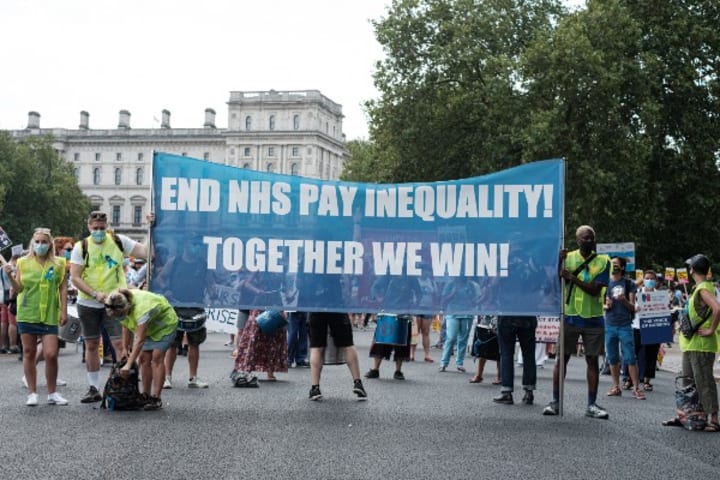
At the same time, there is an added benefit of reaching new people. While the general image of white men in factory unions is a prevailing one, it is largely incorrect. According to the Bureau of Labor Statistics 2020 report on union members:
Black workers remained more likely to be union members than White, Asian, or Hispanic workers.
And that number has risen from 11.2% in 2019 to 12.3% in 2020. The same is true with Latinx workers going from 8.9% to 9.8%. Appealing to the core base of white workers now will have a secondary benefit of peeling off some minority voters that tend to vote in much higher proportions for Democrats. And being a blind spot for Democrats is another benefit in which a plotting Republican Party has succeeded in the past, and they could do so again.
Union Affiliation by State
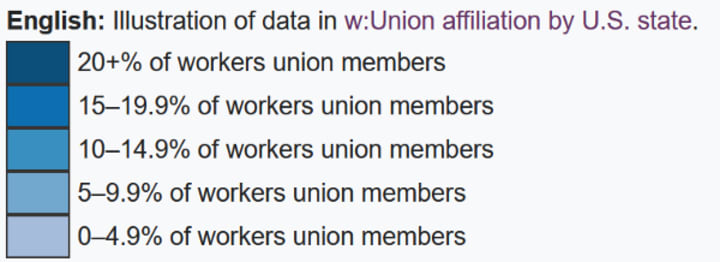
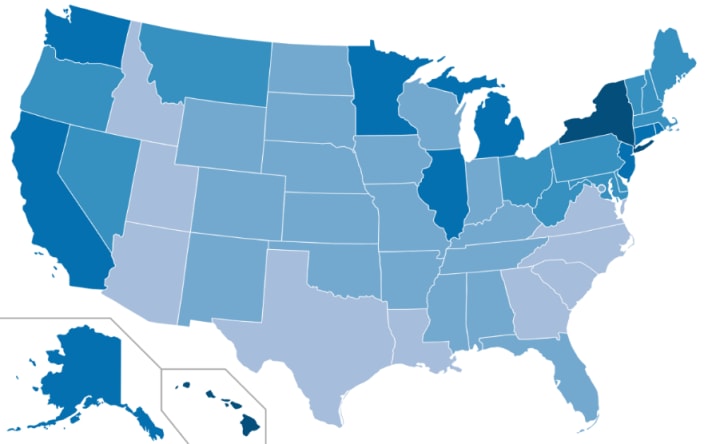
Even though union membership is at the lowest in Republican strongholds in the South and Center, one must remember: it is not about capturing everyone. The only important thing—as far as the Party is concerned—is to get more votes than their opponents. When margins across States are less than 10,000 votes, even a small shift here could have a massive impact.
» IMMIGRATION
In order to appeal to Latinx voters, though, it will take more than support for workers. Rhetoric among Republican candidates trends towards unabashedly anti-Hispanic sentiment and as such the group tends to reject the party en masse. Except Hispanic people are not monolithic and come from an array of backgrounds and cultures. As Pew Research Center noted in October 2020, voters of Cuban descent are more likely to lean Republican 58% to 38% versus all other Hispanics that are the opposite at 32% to 65%.
To put it another way, Republicans have had great success with Cubans. As a specific example, it was Cuban voting patterns in Florida that gave the State handily to Donald Trump in 2020. Other Latinx groups with people originating or descended from places like Mexico, Ecuador, and Venezuela are places where Republicans can make inroads. Overall, many in the Latin world tend to be more religious and conservative in their beliefs, which would align them closer to the current Republican Party. Further, a significant proportion grew up in rough situations whether it was economic collapse, perceived socialism gone wrong, or violent conditions. In any of these situations, it makes a case for a strong government that can protect people and their values.
What is keeping Republicans from gathering a greater share of these groups is their stance on immigration and their treatment of people trying to escape those conditions. That said, it would not take substantial mental gymnastics for Republicans to change their tune here. They can—and will—say that they were not against immigration; just that they were against undocumented (a.k.a. “illegal”, but they won’t use that term in the future) immigrants. Instead, they will present policies that will create easier paths for people to come to America to work and perhaps stay and become citizens. They will portray the Democrats as the ones who want lawlessness and chaos at the border while they want to give people a path they can understand and follow.

Meanwhile, it is not just to gain voters from Latin countries, but also due to another issue facing America. Currently, the birthrate is below replacement (i.e., on average a woman is having less than two children) and it is trending further downward. At some point in the near future, we will need immigrants just to replace those workers that were lost. And imagine if those workers came here on a government program created and supported by Republicans, and then join unions!
Of course, Hispanic groups are not the only ones an immigration path like this will appeal to. Many eastern European and former Soviet bloc countries have very similar cultures when it comes to religion and conservatism. These countries are often at odds with Western Europe on how the European Union should be run and how to protect their people and interests. Expanding a similar program to these types of people will further allow them to be “pro-immigrant” while also having a sizable amount of those immigrants be white Europeans, thus not disenfranchising the core base.
» ANTI-DISCRIMINATION
Speaking of that core base of older, whiter, more male people—as noted that group is shrinking in the country and over time will come closer to being a true minority. While America is “minority majority”, that is only by adding up vastly different groups together. And white people are not singular in their cultures and beliefs, either, and that is the argument that the Republican Party will make.
While the Republican Party was founded mostly to stop the spread of slavery and to dismantle it where it existed, once in power they failed to stop the spread of discrimination. Further, as time went on, the party became the progenitor of discriminatory laws and actions. Today, the Republican Party would never say they are for laws that discriminate, but they do say they are against laws like Affirmative Action and policies like extending Title IX protections to all gender and sexual identities. The reason for this, they claim, is that it causes an affront to religious freedoms, and that for some reason one part of the first Amendment ranks higher than another part.

This is where their populist message to those who feel disenfranchised will find a new turn. Instead of fighting against anti-discrimination laws, they will instead embrace them as a weapon against Democrats. Here, they will say that these shrinking groups are being marginalized and need all the same protection of the laws that minority groups get. The argument will expand to how—in order to have “fairness”, “an even playing field”, and “equal opportunity”—that all people must be treated the same. Instead of fighting against laws to limit discrimination, they will battle for those laws to include their core constituents so that they are “not lost in a changing America”.
» PERSONAL FREEDOMS
Expounding further on discrimination, in 1856, the Republican platform stated:
That, with our Republican fathers, we hold it to be a self-evident truth, that all men are endowed with the inalienable right to life, liberty, and the pursuit of happiness, and that the primary object and ulterior design of our Federal Government were to secure these rights to all persons under its exclusive jurisdiction...
It would seem, then, that the Republican Party from the get-go has been about protecting all people no matter their demographics, conditions, or preferences. Except, of course, they have not. As noted, they have fought relentlessly against gender identity and sexuality equality, created legislation that marginalized and unduly impacted people of color, passed massive regulations and programs to control what people see and consume, and have been actively involved in witch-hunts against people even for their political thoughts.
Despite this, there have been areas where Republicans as a party have still fought vehemently for personal freedom. This has been about freedoms of speech (even hateful speech), religion, commerce, and property. Yet even these stalwarts of Republican core values will come to an end and be replaced with a moralistic dictatorial approach.

In order to fight the expansion of populations in liberal centers—especially cities—they will endorse policies that control how land can be used and developed. To “protect women”, they will try to pass laws like Switzerland, France, Denmark, the Netherlands, and Austria have that say how women can dress (these countries all have approved bans on full face coverings like burqas). Other situations will include limiting grants for artistic expressions they find “offensive”, and trying to eliminate existing art the same way statues of slave holders and Confederates have been removed in the early 2020s.
The bottom line is, the Republican Party will no longer even pretend they believe in “personal freedom” and instead will replace it with the “moral imperative” to help people live a “better life”.
» GUN CONTROL
As discussed earlier, since 1856 the Republican Party has been an adamant supporter of the 2nd Amendment right of keeping and bearing arms. While not often thought of as a civil rights issue, gun owners and those who desire to own firearms are expressing their interpretation of what the 2nd Amendment means and how it aligns to the freedom of individuals. We are not here to discuss the merits of that, just note for over 165 years Republicans have made it clear that the government should have no say in gun ownership.
Of course, that will have to change.
In order to be the party of the “moral center”, Republicans must acknowledge that there are “others” who are not in this center, and therefore cannot be trusted. And there is one civil right they have been able to successfully restrict and uphold in many courts: voting. Convicted felons, even after serving a full sentence, can be disenfranchised from their vote by the way the law is written and how the courts have interpreted the Constitution. States and Territories that have these types of systems are shown below for you to make you own judgement on what particular areas are mostly covered versus those that are not:
Map Showing Disenfranchisement Laws by State

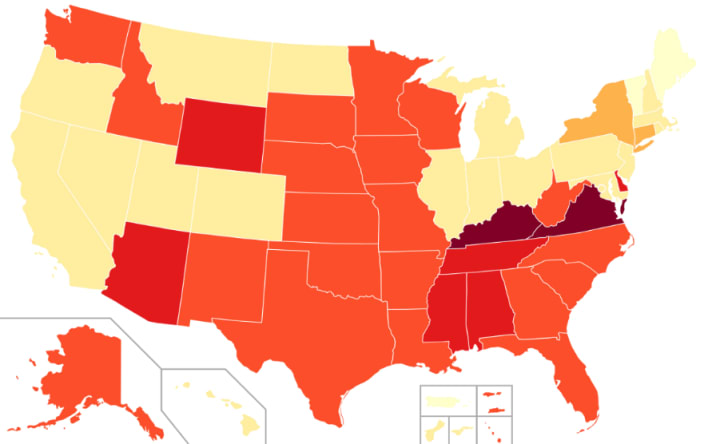
Further, if we look at the percentage of the population that are disenfranchised in these States and Territories based upon the laws, we see this:
Map Showing Estimated Disenfranchisement by State
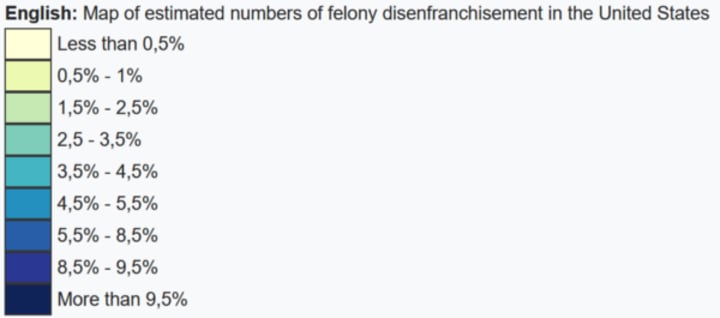
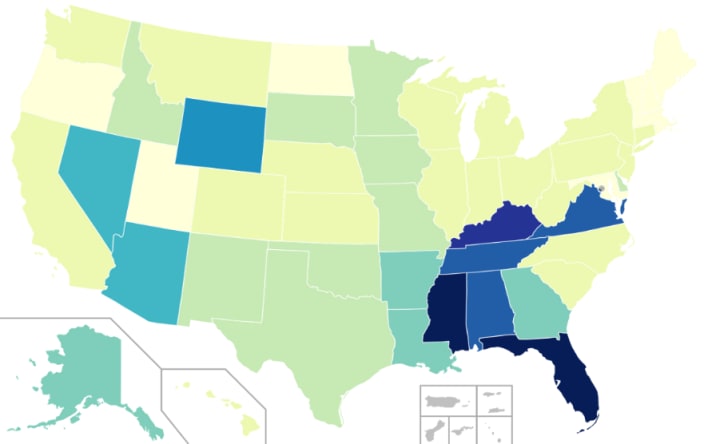
Ergo, if one civil right can be restricted for being a former felon, certainly another right could be constrained for the “safety” of all and to protect that “moral center”. Of course, we then need to ask what populations are disproportionately incarcerated in the United States (not to mention that the United States has the largest percentage of its population in prison and jail in the world to begin with):
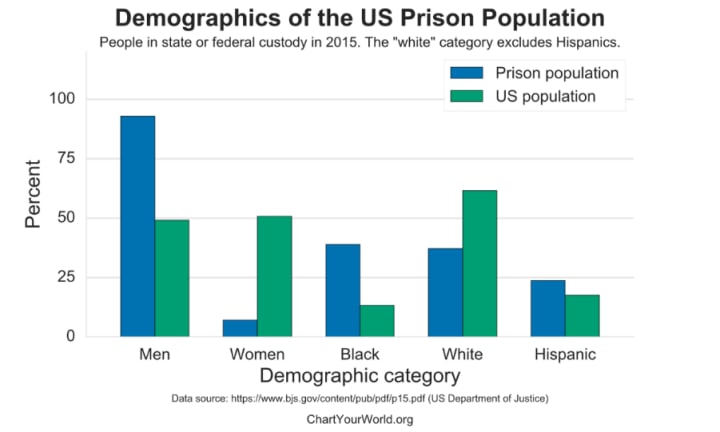
Again, not going too deep into the numbers—and acknowledging this is a gross oversimplification that glosses over many other categories of people and various demographics—it is fair to note that most people of color who are incarcerated were found guilty of nonviolent crimes. Further, people of color are vastly more likely to be arrested for and convicted of the same crimes, and serve longer sentences compared to their white counterparts.
That is not the nuanced discussion or argument the Republican Party will be looking to have. Instead, they will want to extend restrictions on civil rights—including gun ownership that they have fought so hard for their entire existence—for “dangerous convicted criminals”. It just so happens that doing so would disproportionately impact people of color, which would once again soothe that base from which they are building the party.
» FEDERALISM AND REGULATION
To implement the removal of rights like this, the Republican Party could continue to work on laws and regulation on a State-by-State basis. They have successfully been able to make the most impact at the State level for decades, which in turn helped set the direction at the Federal level. Since the Republican Party has always stood for States’ rights, it seems a natural progression to do so.
Except we have already covered examples such as with California and the FCC where the Republican party is trying to use Federalism to push their desires downward from the top. And it is not stopping on that issue as they have already tried and are currently trying to do the same for issues like environmentalism (more on this later), abortion access, the definition of marriage, and more. One particular area they will zone in on will be voting logistics and rights because—demographically—they need to control where and how people vote in order to ever hold a majority at the Federal level again. Natural voting patterns would not eliminate Republicans from serving any particular Federal office, but their numbers would be significantly limited without the gerrymandering that has been further expanding in the 2020s.
As discussed above, using Federalism to create new definitions of protected classes of people will also be on their agenda. In similar protectionist themes, they will advocate for growing Federal policing agencies—which would contrast the “well regulated Militia” that the 2nd Amendment specifically lays out. So here again Republicans would want to take power away from the States (or at least some of the States) and confer that into the Federal government.
This, of course, can only lead to one thing: regulation. In order to implement policy and force others to follow it, one must have regulation and agencies to enforce and prosecute those decrees. We are seeing this come to fruition now in the Republican Party’s fight against “cancel culture”. Members of Congress and State legislatures are trying to create rules around how social media and online communication work. They say it is about “freedom of speech” except the Republican Party of yesteryear would have protected a private company since “free speech” is about public settings and relates to the government not restricting it; certainly not how a private company acts. But if they want to push this definition, it means they want regulation and Federal enforcement.

And this is what happens when you define yourself as morally superior. If you are and you want others to act the way you believe they should act, then you are going to regulate them and use the tools of the Federal government to do so. Since the Republican Party will want to be that “moral center”, then they will be the biggest proponents of regulation and Federal interference.
» WELFARE AND ENVIRONMENTALISM
“Tonight, we renew our resolve that America will never be a socialist country.”
President Donald Trump during his State of the Union on February 5, 2019
“We will protect Medicare and Social Security. We will always and very strongly protect patients with pre-existing conditions. And that is a pledge from the entire Republican Party.”
President Donald Trump during the Republican National Convention on August 28, 2020
The United States of America is a socialist country. We have a program that is literally called “Social Security” that is the very definition of socialism. Any program that the government runs by taking money from some people to give a benefit to many or all others is socialism—such as building and maintaining roads or having a standing armed forces.
However, when the Republican Party rallies against “socialism” they are really saying they are against “social safety net” programs. Except, apparently, they do care about making sure ones that large swaths of their constituents use are maintained, robust, and available. Suffice to say, the Republican Party of today is for socialism in certain situations that are beneficial to them.
So why would it stop there?
Yet, directly providing socialist programs to people would not mesh with the Republican brand. Instead, they will work within a framework they can find more palatable. For instance, instead of more regulation and stick diplomacy to get employers to pay employees more (i.e., minimum/living wage, protections for independent contractors, etcetera), they would want to take a more “carrot” approach. This would come in the form of subsidies and tax breaks for companies that meet criteria such as paying a higher average wage. They would present this as an incentive for private companies that keeps the government out of their affairs. In reality, this would amount to corporate handouts instead of to the people, but in either case it would still be welfare.
On the same subject of business, the Republican Party will have to change their tune on environmentalism. Green energy is a large and growing industry in America and already many forms of it are cheaper than fossil fuel alternatives. As economies of scale continue, eventually it will not be cost efficient for companies and people not to use renewable sources whenever and wherever possible. Continuing to provide subsidies to fossil fuel companies with large foreign holdings and ownership will not only be anti-competitive, it will become a national security concern.
This is where Republicans can easily turn and embrace policies much closer to right wing governments elsewhere in the world. Protectionist policies require that the country not be dependent on foreign organizations for energy and similar production. If an important slice of the pool of potential voters are isolationists, then the Republican Party must embrace companies that can produce all of our needs domestically. Expect to see a full embrace of the business of environmentalism.

» GOVERNMENT SPENDING
Subsidies to businesses cost money. Building infrastructure and removing fossil fuel use from the grid and homes costs even more money. Regulating States, expanded Federal programs, supplementary Federal policies, more Federal police—everything previously discussed is going to cost money.
Fiscal conservatism is already dead in the Republican Party. Even without the COVID-19 Pandemic (which is an emergency situation that should not be considered in any statistics), Republicans have used their time in control of Congress and the White House cutting taxes and increasing spending. For instance, the military and adjacent activities already amount to nearly $1 trillion (with a ‘T’!) and is growing annually, even though the country is not officially at war anywhere.
Of course, they are not solely to blame for this, but it is a matter of factual record that there has not been a balanced budget since FY2001, and that one did not work out due to 9/11 and the recession that followed.
The only way to pay for all this without cutting costs elsewhere and not increasing taxes is with either novel revenue generating mechanisms or taking on more debt. And this is what the story of the Republican Party will be: not one of even discussing cutting spending (except to programs that go against their moral imperative), but to one that explains why they are better at managing novel revenue sources and debt.
» COURT REFORM
Even with all of these pivots away from historical and current policies, the trends are not in favor of the Republican Party. Not that they are in any danger of going extinct any time soon (save a complete schism), but changing demographics are ushering in new places of Democratic control. Look no further than the flip of the Senate seats in Georgia in the 2020/2021 runoff election from Republican to Democrat to see where and how things are changing. Even in a State like Texas the demographics and voting patterns are moving further away from Republican control.
This is not the case everywhere, but it certainly is in a lot of key areas. What this will lead to is Executive control being nearly monopolized by Democrats in various States and at the Federal level, which in turn gives the Democrats control of appointing judges to the courts. Although Republicans have been amazingly successful in getting their desired judges appointed—especially from January 2017 to January 2021—even those people will eventually move on, retire, die, or leave their positions for any variety of reasons. The longer Democrats control things at the Presidential and Governor levels, the more they will be able to replace conservative judges with liberal ones, thus impacting the long-term direction of the country.

In order to mitigate the “liberal agenda” of “packing the courts” with their picks, the Republican Party will embrace reforms on the Judicial Branch. This will come in the form of term limits for judges and the ability for legislatures to overrule court decisions. Basically, it will be a way to “re-balance” the co-equal branches so that one—the legislature—is a little more equal than the other two.
» PARTY ON
Is it difficult to imagine a Republican Party that supports unions, has an open immigration policy, wants to expand the classes of protected people, tells people how to live their lives, pushes gun control legislation, creates and implements new regulations, and embraces welfare and environmentalism? Is it just as difficult to align the Republican Party of the 2020s with the one that put forth its manifestos in 1856 and 1860?
At the end of the day, like any organization or person, the Republican Party has the right to define itself in any way it pleases. The Party has evolved over time to what it is today, and will continue to metamorphosize going forward. Where it will land after this is beyond our purview, but rest assured that so long as it exists the Republican Party will always become something else.
If you are looking for a political party that is fiscally conservative, respects and protects the rights of individuals and their property, wants the government out of your daily life, and believes your local government is more important than the Federal one—the Republican Party of today is most likely not for you.
The future Republican Party certainly is not.

The above piece is an excerpt from Always Divided, Never United: And Other Stories During a Time of Pandemics and Politics by J.P. Prag, available at booksellers worldwide.

Learn more about author J.P. Prag at www.jpprag.com.
About the Creator
J.P. Prag
J.P. Prag is the author of "Compendium of Humanity's End", "254 Days to Impeachment", "Always Divided, Never United", "New & Improved: The United States of America", and "In Defense Of...", and more! Learn more at www.jpprag.com.


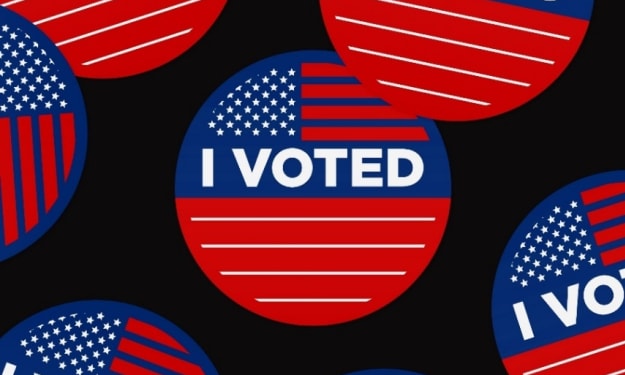



Comments
There are no comments for this story
Be the first to respond and start the conversation.